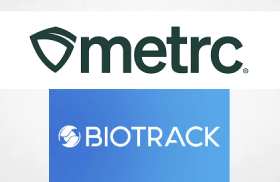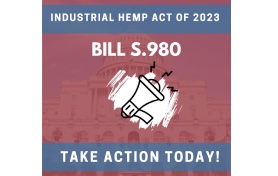Press Release
Grain & Fiber Hemp Exemption Team of National Hemp Association, Agricultural Hemp Solutions & IND HEMP Celebrate Introduction of S.980
Washington DC, March 29, 2023 (GLOBE NEWSWIRE) — WASHINGTON, D.C. – U.S. Senators Jon Tester (D-MT) and Mike Braun (R-IN) introduced the Industrial Hemp Act of 2023 (S.980), to break down barriers for farmers interested in participating in the hemp industry. Hemp has been growing, again, in the United States for the last nine years. It’s time that we reduce the burden on farmers who grow grain and fiber hemp. The end-use products that result from their production have always been recognized and exempted from the Controlled Substances Act. Further, under the current USDA rules, if a crop fails the compliance test the option is to sell only the stalk and seed. These facts reinforce the logic that when fiber or grain is the intended harvested material, there is no rationale to burden the farmers who grow fiber and grain crops with background checks or costly mandatory sampling and testing protocols.
“Montana farmers don’t need government bureaucrats putting unnecessary burdens on their operations,” said U.S. Senator Jon Tester. “It’s time we cut red tape, and make it easier for industrial hemp farmers to get their product to market. My bipartisan bill builds on Montana’s leadership on hemp policy and creates good-paying jobs for folks across rural America.”
“It’s important that we set American farmers up for success by cutting burdensome regulations and red tape,” said U.S. Senator Mike Braun. “This legislation will expand opportunities for industrial hemp producers in Indiana and across the country and allow them to tap into one of the fastest growing agricultural markets.”
“There is a very distinct visual difference between hemp grown for fiber or grain and cannabinoid/floral hemp. The current regulatory framework, which revolves around the perceived risk of cannabinoids, makes it untenable for hemp to be placed in a rotation with other common commodity crops like corn, soy, or wheat,” said National Hemp Association Executive Director, Erica Stark.
“When the 2018 Farm Bill took the ‘industrial’ out of the industrial hemp definition, we lost an important distinction between very different crops. Our business has had great success in Montana in large part due to the great leadership we have in the state Department of Agriculture. We are excited to see Montana Senator Jon Tester take this common-sense policy to a federal level,” said Morgan Tweet, Founder and COO, IND HEMP.
“Agricultural hemp stands for sustainability and freedom to the farmer, the manufacturer, and the homeowner. At HempWood we support the Industrial Hemp Act of 2023 because it allows our farmers to concentrate on farming rather than paperwork and fees,” said Greg Wilson, Founder, HempWood.
“We started strong with a handful of farmers growing in a few Kentucky counties. After a couple of years, we found it increasingly difficult to attract acreage from the farms best equipped to grow our grain varieties. Not because of agronomic challenges, but because growing hemp seed requires clearing excessive regulatory hurdles. We have all the resources we need to grow this crop in proximity to our processing center in Kentucky, but frustratingly can’t attract the farmers because the hassle and risk do not justify the return for the farmer. Hemp seed will never be more than a niche crop as long as we treat it so differently from the major row crops. There is no risk to consumers, farmers, or their neighbors in exempting hemp for grain and fiber from these onerous regulations. For farmers that are growing hemp grain, providing a regulatory exemption will help us bring our supply chain back home, said Chad Rosen, CEO and Founder, Victory Hemp Foods.
“Since 2014, the Farm Bill has defined hemp and broadened how we may grow it- initially for research purposes and now for commercial production. The 2018 Farm Bill signed into law a new definition recognizing hemp as an agricultural commodity. However, this critical step towards legalizing hemp farming nationwide did not account for industry nuances when growing and processing diverse crops, particularly grain and fiber. The Industrial Hemp Act of 2023 provides the regulatory ease and clarity needed to bring grain and fiber hemp back into rotation,” said Courtney N. Moran, LL.M., Chief Legislative Strategist, Agricultural Hemp Solutions.
As we look to unleash the full potential of hemp to provide another cash crop for farmers, create domestic manufacturing jobs with local supply chains, produce more sustainable consumer goods, and mitigate climate change, we need millions of acres grown. To achieve these goals, we need to remove the barriers that prevent industrial hemp from being grown on a commercial scale, which is exactly what the Industrial Hemp Act of 2023 will accomplish.
Help support this important legislation by taking action today!















